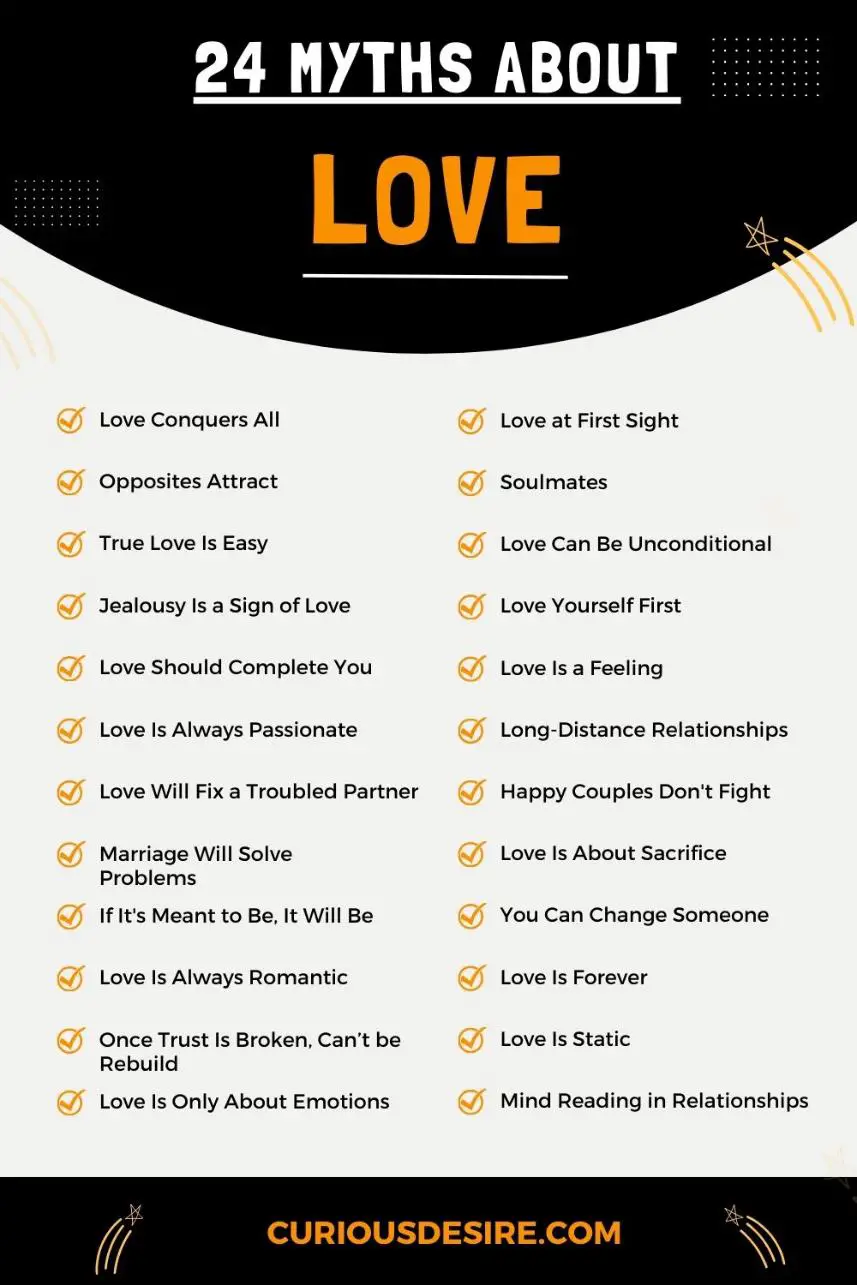From ancient stories to contemporary romance novels, cultural stories often influence how we see love.
In this blog post, we will uncover common myths about love, looking at where they come from, and why they stick around, and finally debunk them to show how genuine connections are nuanced and complex.
5 Common Myths About Love:
- Love Conquers All
- Unconditional Love
- Love Should Complete You
- Love Is Always Passionate
- Love Is Static
[toc]

Myth 1: Love Conquers All
Why it exists:
Throughout history, love stories in literature, folklore, and mythology often portray love as an unstoppable force.
These cultural narratives contribute to the notion that love has the strength to overcome any hurdles.
Debunking:
While love is undoubtedly a crucial element in a relationship, it alone is not sufficient. Practical issues, differences in values, and communication breakdowns require attention and effort.
Successful relationships involve a combination of love, communication, compromise, and shared goals.
Myth 2: Love at First Sight
Why it exists:
Some individuals report experiencing an immediate and intense connection with someone upon first meeting.
This intense connection may feel like love and contribute to the belief in love at first sight.
Debunking:
True compatibility involves time, shared experiences, and understanding each other’s complexities.
Initial attraction may create interest, but a lasting, meaningful connection requires a deeper exploration of each other’s personalities and values.
Myth 3: Opposites Attract
Why it exists:
One reason behind the notion is the idea that individuals with opposing strengths or qualities may complement each other well.
For instance, a more outgoing person might be attracted to someone more reserved, creating a balance in the relationship.
Debunking:
While some differences can enhance a relationship, long-term success often comes from shared values and common ground.
Too many disparities can lead to challenges in communication and understanding, potentially causing issues in the relationship.
Myth 4: Soulmates
Why it exists:
Many cultures and societies have a long history of romanticizing the idea of a perfect, destined love.
This idealism often leads to the notion that there is one person uniquely meant for each individual.
Debunking:
People can have multiple compatible partners and successful relationships are built on effort, understanding, and shared commitment.
The idea of a singular soulmate overlooks the potential for meaningful connections with various individuals.
Myth 5: True Love Is Easy
Why it exists:
Media often portrays romantic relationships simplistically, emphasizing the idea that true love should be effortless.
Movies, books, and songs tend to focus on the magical and uncomplicated aspects of love, contributing to the perception that it should come naturally.
Debunking:
Relationships require effort, compromise, and communication. Challenges are natural, and overcoming them together strengthens the bond.
The belief that true love is always easy can lead to unrealistic expectations and disappointment.
Myth 6: Love Can Be Unconditional
Why it exists:
The idealization of relationships in popular culture often perpetuates the idea that true love should be unconditional.
Couples are portrayed as overcoming any challenge through undying and unconditional love.
Debunking:
Healthy relationships involve boundaries and expectations. While love can be enduring, mutual respect and certain conditions are essential for a relationship to thrive.
Setting healthy boundaries is not a sign of a lack of love but a crucial aspect of maintaining a balanced relationship.
Myth 7: Jealousy Is a Sign of Love
Why it exists:
There’s confusion between passion and possessiveness, leading some to believe that feeling jealous is an indicator of deep love.
Debunking:
Trust and respect are healthier indicators of love than jealousy. Excessive jealousy can lead to toxic relationships, eroding trust and creating an unhealthy dynamic.
Open communication and trust-building activities are essential to fostering a secure and loving relationship.

Myth 8: You Can’t Love Someone Else If You Don’t Love Yourself
Why it exists:
Society often emphasizes the importance of independence and self-sufficiency.
This emphasis may contribute to the belief that one must achieve a certain level of self-love and fulfillment before being capable of loving someone else.
Debunking:
The fact is people with insecurities or self-doubt can still experience and give love.
Healthy relationships can contribute positively to personal growth, and individuals can learn to love themselves through supportive and caring partnerships.
Myth 9: Love Should Complete You
Why it exists:
Many cultural narratives, often romanticize the idea that finding love completes an individual.
These portrayals create an idealized notion that a romantic partner is the missing piece that brings fulfillment.
Debunking:
Healthy relationships involve two whole individuals coming together, not relying on the other for completeness.
Each person should maintain their independence, and the relationship should complement their lives rather than serve as a sole source of fulfillment.
Myth 10: Love Is a Feeling, Not a Choice
Why it exists:
Some people believe in the idea of fate or destiny in love. This means they think that who you love is already decided like it’s meant to happen.
This way of thinking makes it seem like you don’t choose who you love—it just happens.
Debunking:
Love involves both emotions and conscious decisions. Choosing to love and commit is essential for a lasting relationship.
While initial feelings may be spontaneous, sustaining love requires intentional effort, communication, and a commitment to the relationship through both ups and downs.
Myth 11: Love Is Always Passionate
Why it exists:
Society sometimes emphasizes the idea that true love is always characterized by intense passion.
This social expectation can influence people to think that passion should be a constant feature in their romantic relationships.
Debunking:
While passion is important, it can evolve and fluctuate over time. Deep, enduring love may not always be characterized by intense passion but includes companionship, trust, and understanding.
A lasting relationship encompasses various dimensions beyond the initial spark.
Myth 12: Long-Distance Relationships Never Work
Why it exists:
The physical distance between partners in a long-distance relationship can create challenges in terms of feeling each other’s presence, having someone physically close, and sharing everyday moments.
Likewise, face-to-face interactions are limited in long-distance relationships, making it challenging to convey emotions, share experiences, and build a connection in the same way as when partners are physically present.
All this contributes to the view that long-distance relationships never work.
Debunking:
The fact is long-distance relationships can flourish in unique and meaningful ways, sometimes even stronger than close proximity relationships.
In long-distance relationships, communication tends to be more intentional and meaningful. Partners often cherish the moments they have to talk, leading to deeper and more thoughtful conversations.
Being physically apart emphasizes the value of the time spent together.
Partners in long-distance relationships often have a heightened appreciation for the moments they can share, making their time together more meaningful.
Moreover, the physical distance allows individuals in the relationship to maintain a sense of independence and pursue personal growth.
This independence can contribute to a stronger, more resilient partnership.
Myth 13: Love Will Fix a Troubled Partner
Why it exists:
Stories where love transforms troubled individuals into better versions of themselves contribute to the notion that love has the magical ability to heal and fix.
Debunking:
Personal growth and change come from within. While love and support are important, they can’t replace the need for an individual to address their own issues.
Healthy relationships involve mutual support, but expecting love to be a cure-all can lead to unrealistic expectations.
Myth 14: Happy Couples Don’t Fight
Why it exists:
Media often portrays idealized versions of relationships, emphasizing harmony and avoiding conflict.
This unrealistic representation can lead to the misconception that happy couples never experience disagreements.
Society, at times, fosters an expectation that successful relationships should always be smooth and free of conflict.
This societal pressure may contribute to the myth that disagreements are a sign of an unhappy relationship.
Debunking:
Healthy couples have disagreements, but it’s how they handle conflicts that matter. Effective communication and resolution strengthen the relationship.
Learning to navigate differences and conflicts constructively is a crucial skill for a lasting partnership.
Myth 15: Marriage Will Solve Relationship Problems
Why it exists:
Many cultures place a significant emphasis on the institution of marriage as a symbol of commitment and stability.
There is a cultural narrative that once a couple gets married, their commitment is solidified, and problems should naturally be resolved.
Debunking:
Marriage is a commitment, but it doesn’t automatically solve underlying problems. Open communication and addressing issues are crucial for a successful marriage.
A strong foundation built on understanding and shared values is essential for a healthy marital relationship.
Myth 16: Love Is About Sacrifice
Why it exists:
Society may perpetuate the notion that true love involves making significant sacrifices, and individuals who prioritize their own well-being are sometimes viewed as selfish.
This societal expectation can shape the way people perceive love and sacrifice.
Debunking:
Healthy relationships involve compromise, not sacrificing one’s well-being.
Both partners should feel valued and supported, and the relationship should be a mutual give-and-take.
Sacrificing one’s own happiness can lead to imbalance and resentment.
Myth 17: If It’s Meant to Be, It Will Be
Why it exists:
Romantic literature, movies, and media often portray love stories where the protagonists are destined to be together despite challenges.
This narrative contributes to the idea that true love will inevitably overcome any obstacle.
Debunking:
Successful relationships require effort, choice, and commitment. Waiting for fate may lead to missed opportunities for growth and shared experiences.
Relationships need active participation and a willingness to navigate challenges together.
Myth 18: You Can Change Someone If You Love Them Enough
Why it exists:
Individuals may have a strong desire for an ideal partner, and the belief that love can change someone plays into the notion of molding a person into the perfect match.
Some people have a natural inclination to rescue or fix others, known as a “savior complex.” This tendency can lead individuals to believe that their love and support can be the catalyst for positive change in their partner.
Debunking:
People change willingly and through personal growth. Trying to force change can lead to resentment and strain the relationship.
Acceptance and support are essential, but expecting love alone to be a catalyst for complete transformation may lead to disappointment.
Myth 19: Love Is Always Romantic
Why it exists:
This myth exists because the media often emphasizes the romantic aspect of love, portraying it as a series of grand gestures and romantic moments.
Debunking:
Love manifests in various forms, including companionship, friendship, and support. It’s not always characterized by grand romantic gestures.
The depth of connection goes beyond romantic moments and includes the everyday support and understanding that partners provide each other.
Myth 20: Love Is Forever
Why it exists:
The idea that “Love is forever” exists because of exaggerated portrayals of love in media, books, and novels.
These romantic stories often highlight eternal and timeless love, creating the belief that love should last forever.
The influence of these exaggerated depictions in shaping societal views contributes to the notion that true love is an unchanging and enduring force.
Debunking:
In reality, relationships evolve, and people grow and change over time.
Expecting love to last forever can set unrealistic standards and overlook the complexities of human relationships.
Myth 21: Once Trust Is Broken, It’s Impossible To Rebuild
Why it exists:
Trust is considered fragile, and betrayal is often seen as irreparable, leading to the belief that rebuilding trust is an insurmountable task.
Debunking:
Rebuilding trust is challenging but not impossible with open communication, and genuine efforts to address the underlying issues.
While it may take time, trust can be restored through consistent actions that demonstrate reliability and honesty.
Myth 22: Love Is Static
Why it exists:
Some individuals find comfort in the idea of stable and unchanging love because it provides a sense of security and predictability.
The uncertainty of how love might evolve or change over time can be intimidating for those who prefer a more constant emotional state.
The desire for permanence in relationships may lead individuals to project this yearning onto the belief that love should be unwavering.
Debunking:
Relationships evolve, and love needs to adapt to changes in individuals and circumstances. Flexibility and growth contribute to a healthy relationship.
The ability to embrace transformations in love over time enhances the connection between partners.
Myth 23: Love Is Only About Emotions
Why it exists:
The belief that love is only about emotions exists due to romanticized cultural narratives, media portrayals, and societal norms that often emphasize the intense emotional aspects of love.
Debunking:
Love involves practical aspects such as communication, respect, and shared values. Emotional connection is essential, but it’s not the sole component of a successful relationship.
Acknowledging and addressing the practical dimensions of love contribute to a more comprehensive and sustainable connection.
Myth 24: You Should Know What Your Partner Needs Without Asking
Why it exists:
Many romantic stories suggest that real love involves a special connection where partners can almost read each other’s minds.
This idea makes people believe that talking about what they need isn’t necessary because their partner should just know.
This romantic notion plays a significant role in why some people believe in understanding each other without having to say anything
Debunking:
People are unique individuals with different backgrounds, experiences, and communication styles.
It’s unreasonable to expect that partners can intuitively understand each other’s needs without explicit communication. Open and direct communication is the foundation of a healthy relationship.
Assuming that partners should know each other’s needs without asking can lead to unmet expectations and unnecessary misunderstandings.
Love Myths FAQs
1. What is the Meaning of Romantic Myth?
The term “romantic myth” refers to idealized and often unrealistic beliefs or expectations about love and romantic relationships.
These myths are perpetuated by cultural influences, media, and societal norms, shaping individuals’ perceptions of what love should be.
2. Is Love True or Not?
Love is a complex and multifaceted emotion that can take various forms. It is a genuine and real experience for many people.
The perception of love’s truthfulness often depends on individual experiences, the depth of emotional connection, and the mutual understanding between individuals involved.
3. What Does True Love Feel Like?
True love is often characterized by deep emotional connection, mutual respect, understanding, and support.
It goes beyond infatuation and physical attraction, involving a sense of partnership, shared values, and a commitment to each other’s well-being.
It is a profound and enduring emotional bond.
4. What Are Signs of Love?
Signs of love may include:
- Deep Connection: Feeling emotionally connected and understood.
- Prioritization: Making the other person a priority in your life.
- Empathy: Feeling and expressing empathy towards your partner.
- Respect: Treating each other with kindness and respect.
- Commitment: A willingness to work through challenges and commit to the relationship.
5. How Do You Know That a Boy Loves You Secretly?
Signs that a boy may love you secretly can include:
- Increased Attention: Showing more interest in your life and activities.
- Body Language: Non-verbal cues like prolonged eye contact or physical proximity.
- Genuine Concern: Demonstrating genuine concern for your well-being.
- Remembering Details: Remembering and referencing details about your life.
6. How Do Men Fall in Love?
Men, like women, can fall in love through shared experiences, emotional connection, and mutual understanding.
Factors may include physical attraction, shared values, and a sense of partnership. Each person’s experience of falling in love is unique.
7. Do I Love Him or Not?
Determining if you love someone involves introspection. Ask yourself if you feel a deep emotional connection, prioritize their well-being, and if you envision a future together.
Consider your feelings of happiness and fulfillment in the relationship.
8. Can You Believe in True Love?
Belief in true love is subjective. While some may believe in the concept of a soulmate or lifelong partner, others may view love as a more pragmatic and evolving experience. Personal beliefs about love vary widely.
9. Will I Ever Find True Love?
The journey to finding true love is different for everyone. Patience, self-discovery, and engaging in meaningful connections increase the likelihood of finding a fulfilling and lasting relationship.
10. Is True Love Real or an Illusion?
True love is real for many people, characterized by deep emotional connections and lasting commitment.
However, it’s essential to navigate past romantic myths and acknowledge that love requires effort, understanding, and continuous growth.
11. Is True Love Forever?
The idea of true love being forever is subjective. While some relationships last a lifetime, others may evolve or end.
True love involves adapting to changes, growing together, and navigating the challenges that life may bring.
It is not necessarily a static or unchanging state.

